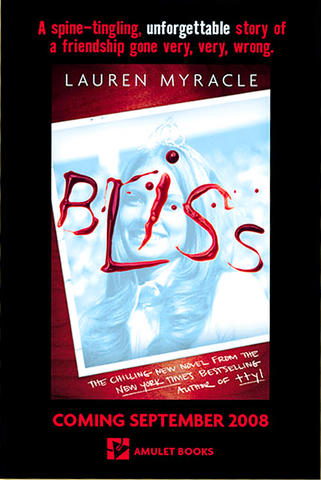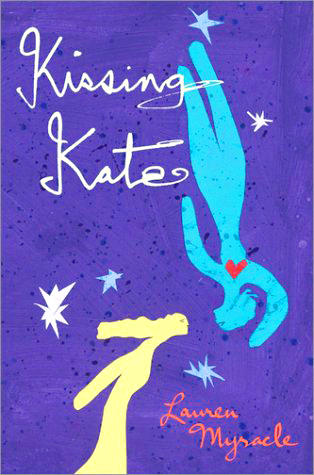Lauren Myracle is 38 going on 15, and fluent in the instant-message lingua franca of the tweens and teens who've made her the literary equivalent of a rock star.
Her novel ttyl - e-shorthand for "talk to you later" - was written in the form of instant messages, composed at the Fort Collins Starbucks that's become Myracle's de facto office.
Along with companion volumes ttfn ("ta-ta for now") and L8r, g8r ("Later, gator"), that book launched a white-hot career arc that's still curving up, trailing Myracle, who seems a little stunned.

"It's so silly!" she says happily.
Wide-eyed, with sassy hair, Myracle punctuates her sentences with exclamation points in print and aloud, waving pink-glitter fingernails for extra emphasis.
She has a vine tattooed on her upper arm, an adornment that shocked her mother's upper-crust Atlanta friends when they spotted it at Myracle's wedding.

PHOTO: NY TIMES NEWS SERVICE
"That's not permanent, is it?" they whispered, appalled - a reaction that explains why Myracle lives in northern Colorado, instead of the white-glove South.
"I'm a Southern girl and that's important to me, but I see the South as a native who's now an outsider," she said.
"Georgia is the land of pastels and ladies who lunch. I'm writing a story about growing up in the South. You know, the South where in Charleston, they ask you who your people are; in Macon, they ask where you go to church; in Savannah, they ask what do you drink; and in Atlanta, they ask where you live."

The level of candor in her novels still shocks Myracle's sister, who also is a writer, and Myracle's mother, who often reviews her manuscripts.
Her mother's insight into How to Be Bad, a book written with two other authors and scheduled for release in May, led Myracle to dramatically tone down her contribution to the conclusion.
Finding the ability to accept advice coincided with her success as an author, she said.
She ignored criticism of her first five books, all roundly rejected by publishers. Her sixth, Kissing Kate, a novel about a lesbian high school girl and her uncertain girlfriend, sold.
It was a modest success, but nothing like the ttyl series that followed. Myracle's editor suggested the concept of writing a novel entirely in instant messages.
"These books just caught on with girls," said Sidney Jackson, a bookseller at the Tattered Cover in Denver. "They're all in dialogue, which probably appeals to kids, and it makes them more authentic - that these are girls talking to each other, really saying things out of their hearts. It's light reading, but everyone needs to read something fun once in a while."
The hectic hues of the covers and the format, snags the attention of browsers, Jackson said.
The simple, bright graphic design invokes the riotous colors popular on teenagers' MySpace and other social networking pages that gave rise to the ttyl trilogy.
"My editor is about my age, and we went to high school in the 1980s, when it was so different from now," Myracle said.
"I remember we thought we were so high-tech when we had three-way phone calls about who was crushing on who. How different that is today for girls who come home and get on the computer to do e-mail, instant-message, update their blog, talk on the phone, and do homework, usually with the TV on, doing all this multitasking. Before ttyl, I didn't have any Internet presence."
Well, she does now.
Myracle's MySpace page lists more than 2,500 "friends," something she once considered so inconceivable that one of her novels makes an eyeball-rolling reference to a girl trawling so earnestly for MySpace friends that she ends up with 1,000.
"In the book, the Winsome Threesome (the three girls whose instant messages constitute ttyl, ttfn and l8r, g8r) are, like, 'Who has 1,000 MySpace friends?' But it wasn't long after that I had 1,500 friends, and then 2,000," Myracle said.
On the other hand, she's quite liberal about "friending" people, accepting most requests to add a name to her MySpace friends list.
She checks the requester's MySpace page and accepts nearly anyone who looks like a teenager, and rejects everyone she describes as "someone who looks like a porn star."
"I'm not really me on MySpace - I'm the author of books for younger teens," she said.
"My son will say, 'Mom, you're famous!' And I do get a lot of teens and tweens writing to me. It's awesome. I'm kind of in the role of a big sister who likes them unconditionally and tells them that their job is not to try to fit in, and no, they don't have to kiss a guy just because he's popular, and other advice I wish someone had given me when I was their age.
"The danger is that some of them think I really am their friend, which I'm not. Sometimes they can be more intimate with me than they need to be, in terms of sharing things."
Girls send e-mails to Myracle to consult her thoughts on whether they should sleep with their boyfriends - a trusting naivete that makes her shake her head. (She counsels them to go immediately to their mothers, and cautions them that "this is a big deal, and not to be entered into lightly.")
One girl was 11 when she initiated an e-mail correspondence that lasted well into her teens. In time, the e-mails grew darker and darker. The girl confided that she thought seriously about suicide. Then she sent Myracle a "farewell" e-mail.
"It scared the crap out of me," Myracle said.
"I had no contact information for her, other than that e-mail address. I wrote her and said, 'Don't! Here's my number. Call me!'
"Then I got onto MySpace and went to different friends, explaining who I was and why I was asking for her number. One girl sent me her number and I called, and I said, 'Hey, this is Lauren Myracle,' and she answered, and she was floored."
Myracle exacted the girl's promise to get help, and today feels optimistic about her outlook.
"It's that tricky thing of wanting to be human, and do the best job you can ... ," Myracle said.

June 2 to June 8 Taiwan’s woodcutters believe that if they see even one speck of red in their cooked rice, no matter how small, an accident is going to happen. Peng Chin-tian (彭錦田) swears that this has proven to be true at every stop during his decades-long career in the logging industry. Along with mining, timber harvesting was once considered the most dangerous profession in Taiwan. Not only were mishaps common during all stages of processing, it was difficult to transport the injured to get medical treatment. Many died during the arduous journey. Peng recounts some of his accidents in

“Why does Taiwan identity decline?”a group of researchers lead by University of Nevada political scientist Austin Wang (王宏恩) asked in a recent paper. After all, it is not difficult to explain the rise in Taiwanese identity after the early 1990s. But no model predicted its decline during the 2016-2018 period, they say. After testing various alternative explanations, Wang et al argue that the fall-off in Taiwanese identity during that period is related to voter hedging based on the performance of the Democratic Progressive Party (DPP). Since the DPP is perceived as the guardian of Taiwan identity, when it performs well,

A short walk beneath the dense Amazon canopy, the forest abruptly opens up. Fallen logs are rotting, the trees grow sparser and the temperature rises in places sunlight hits the ground. This is what 24 years of severe drought looks like in the world’s largest rainforest. But this patch of degraded forest, about the size of a soccer field, is a scientific experiment. Launched in 2000 by Brazilian and British scientists, Esecaflor — short for “Forest Drought Study Project” in Portuguese — set out to simulate a future in which the changing climate could deplete the Amazon of rainfall. It is

The Taiwan People’s Party (TPP) on May 18 held a rally in Taichung to mark the anniversary of President William Lai’s (賴清德) inauguration on May 20. The title of the rally could be loosely translated to “May 18 recall fraudulent goods” (518退貨ㄌㄨㄚˋ!). Unlike in English, where the terms are the same, “recall” (退貨) in this context refers to product recalls due to damaged, defective or fraudulent merchandise, not the political recalls (罷免) currently dominating the headlines. I attended the rally to determine if the impression was correct that the TPP under party Chairman Huang Kuo-Chang (黃國昌) had little of a